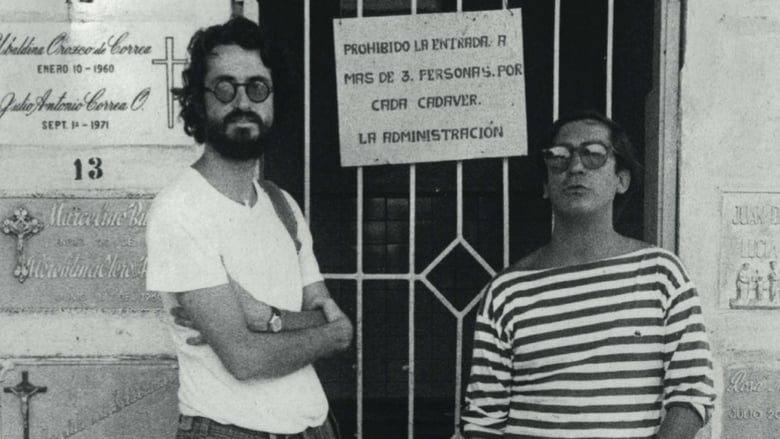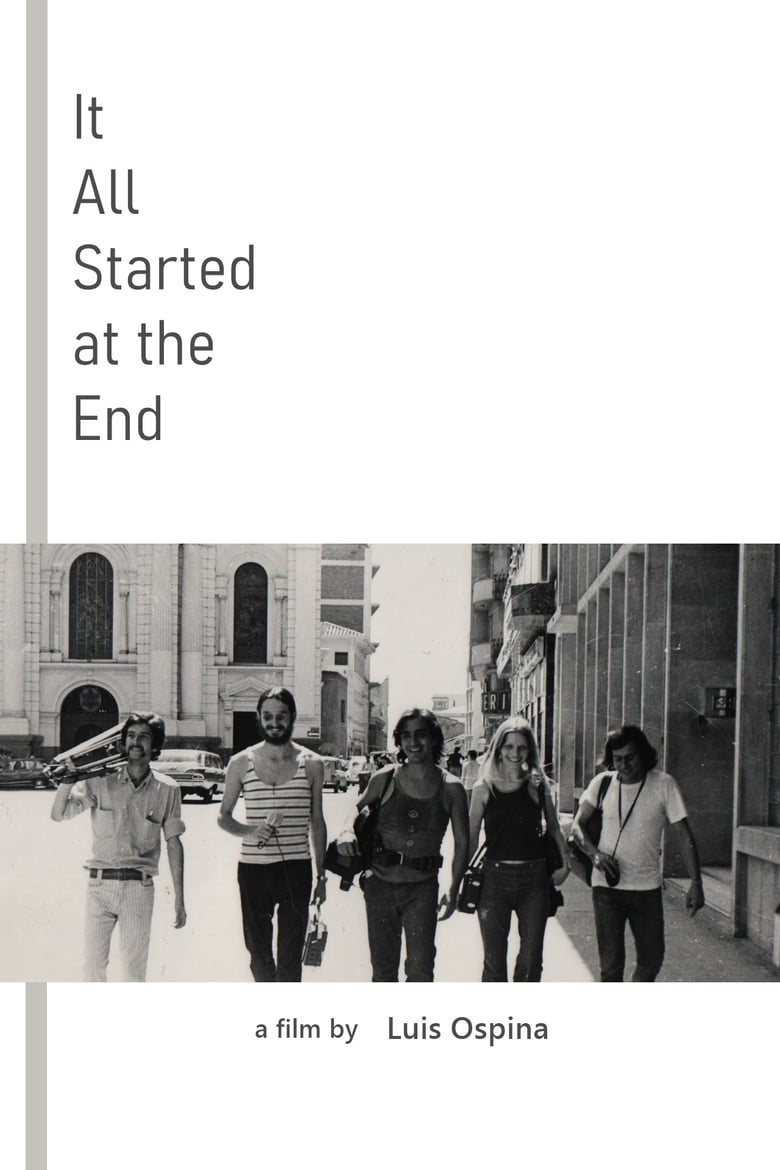

It All Started at the End
Genres
Overview
An intimate portrait of the pioneering artistic collective Grupo de Cali, whose work is now considered a fundamental part of Colombia’s film history.
Details
Budget
$0
Revenue
$0
Runtime
208 min
Release Date
2015-09-13
Status
Released
Original Language
Spanish
Vote Count
10
Vote Average
7.8
Luis Ospina
Himself
Carlos Mayolo
Himself (archive footage)
Andrés Caicedo
Himself (archive footage)
Karen Lamassonne
Herself
Ani Aristizábal
Herself
Ramiro Arbeláez
Himself
Sandro Romero Rey
Himself
Elsa Vásquez
Herself
Miguel Marías
Himself
Patricia Restrepo
Herself
Vicky Hernández
Herself
Rodrigo Lalinde
Himself
Óscar Campo
Himself
Beatriz Caballero
Herself
Lina González
Herself
6.0
Peter Lorre: The Master of Menace
Documentary overview of Peter Lorre's ascension to fame as a master purveyor of silky but disquieting peril.
1996-11-01 | en
6.0
Sexo en el plató
How are the sex scenes filmed? What tricks are used to fake the desire? How do the interpreters prepare and feel? Spanish actors and directors talk about the most intimate side of acting, about the tricks and work methods when narrating exposed sex. In Spain the general rule is that there are no rules. Each film, each interpreter, faces it in very different ways.
2007-04-09 | es
7.2
Tin Tan
Germán Cipriano Gómez Valdés Castillo, a young radio announcer from Cuidad Juárez, succeeds in drawing attention to the pachuco movement through his character Tin Tan, laying the groundwork for a new form of binational and mass linguistic expression: Spanglish. He soon became a leading figure in theater and film on the American Continent. Singled out by critics as a destroyer of the language, he quickly won the approval of the public. His ability to improvise revolutionized the film industry. His talent as an actor, singer, dancer and comedian contributed to the Golden Age of Mexican Cinema. From El Hijo Desobediente to Capitán Mantarraya, from Cuidad Juárez to Havana, from mambo to rock, the legacy of Tin Tan makes him one of the great icons of Mexico today. This film tells his story as it has never been told before.
2010-11-12 | en
6.8
Going Attractions: The Definitive Story of the Movie Palace
Celebrating the splendor and grandeur of the great cinemas of the United States, built when movies were the acme of entertainment and the stories were larger than life, as were the venues designed to show them. The film also tracks the eventual decline of the palaces, through to today’s current preservation efforts. A tribute to America’s great art form and the great monuments created for audiences to enjoy them in.
2019-10-25 | en
0.0
Blaxploitalian: 100 Years of Blackness in Italian Cinema
A documentary that uncovers the careers of a population of entertainers never heard from before: Black actors in Italian cinema. With modern day interviews and archival footage, the documentary discloses the personal struggles and triumphs that classic Afro-Italian, African-American and Afro-descendant actors faced in the Italian film industry, while mirroring their struggles with those of contemporary actors who are working diligently to find respectable, significant, and non-stereotypical roles, but are often unable to do so. Blaxploitalian is more than an unveiling of a troubled history; it is a call-to-action for increased diversity in international cinema through the stories of these artists in an effort to reflect the modern and racially diverse Italy.
2016-06-08 | en
10.0
Disney: Through the Looking Glass
Tito del Amo, a passionate 72-year-old researcher, takes the final step to unravel the enigma about the alleged Spanish origin of the American cartoonist Walt Disney, making the same journey that his supposed mother made to give him up for adoption in Chicago. A journey that begins in Mojácar, Almería, Spain, and ends in New York. An exciting adventure, like Alicia's through the looking glass, to discover what is truth and what is not, with an unexpected result.
2010-01-11 | es
0.0
The Cyberpunk Educator
A 2003 documentary study of mainstream Cyberpunk films of the 1980s created by director Andrew J. Holden. The film uses the structure of literary theorist Northrop Frye to describe the common, repeating stories in Western culture, and how Cyberpunk can be defined and understood according to that analysis, with a focus toward American film industry portrayal of race, gender, and government.
2003-01-01 | en
7.5
The Irishman: In Conversation
Martin Scorsese, Robert De Niro, Joe Pesci, and Al Pacino in conversation about The Irishman.
2019-11-27 | en
7.3
Never Be Boring: Billy Wilder
A funny walk through the life story of Billy Wilder (1906-2002), a cinematic genius; a portrait of a filmmaker who never was a boring man, a superb mind who had ten commandments, of which the first nine were: “Thou shalt not bore.”
2017-10-28 | de
6.0
Steve McQueen: The Essence of Cool
Friends, family, co-stars and admirers of actor Steve McQueen talk about his life and his movie career.
2005-06-01 | en
0.0
Charlie Chaplin: A Tramp's Life
A biographical documentary about the great British actor and director Charlie Chaplin (1889-1977), from rags to riches, from the slums of London to glory.
1998-05-10 | en
7.2
The Celluloid Closet
What "That's Entertainment" did for movie musicals, "The Celluloid Closet" does for Hollywood homosexuality, as this exuberant, eye-opening movie serves up a dazzling hundred-year history of the role of gay men and lesbians have had on the silver screen. Lily Tomlin narrates as Oscar-winning moviemaker Rob Epstein ("The Times of Harvey Milk" and "Common Threads: Stories from the Quilt") and Jeffrey Friedman assemble fabulous footage from 120 films showing the changing face of cinema sexuality, from cruel stereotypes to covert love to the activist triumphs of the 1990s. Tom Hanks, Susan Sarandon, Whoopi Goldberg, Tony Curtis, Harvey Fierstein and Gore Vidal are just a few of the many actors, writers and commentators who provide funny and insightful anecdotes.
1996-01-30 | en
7.0
We Remember Marilyn
We Remember Marilyn. Marilyn Monroe transforms from Norma Jean, a cuddly teenager, into the most recognizable face and body in the world in these home movies, photos and film clips which span her early bit parts to her most known roles.
1996-01-01 | en
7.7
Belmondo, le magnifique
With more than 70 films and 160 million cumulative tickets in France, Jean-Paul Belmondo is one of the essential stars of French cinema.
2017-09-03 | fr
7.0
Gamin
After an extensive immersion work on abandoned childhood, Ciro Durán presents, from his point of view, the life of street children, who have broken all family ties and have regrouped to survive in the concrete jungle.
1977-07-30 | es
7.0
Grisha
An up-close look into the life of the often misunderstood movie director Grigori Kromanov through the lens of old friends and colleagues.
1996-11-08 | et
7.1
The Arrival of a Train at La Ciotat
A group of people are standing along the platform of a railway station in La Ciotat, waiting for a train. One is seen coming, at some distance, and eventually stops at the platform. Doors of the railway-cars open and attendants help passengers off and on. Popular legend has it that, when this film was shown, the first-night audience fled the café in terror, fearing being run over by the "approaching" train. This legend has since been identified as promotional embellishment, though there is evidence to suggest that people were astounded at the capabilities of the Lumières' cinématographe.
1896-06-30 | fr
0.0
Capturar (Las 1001 novias)
2017-03-03 | es
5.7
Barbara Stanwyck: Fire and Desire
Actress Sally Field looks at the dramatic life and successful career of the superb actress Barbara Stanwyck (1907-90), a Hollywood legend.
1991-07-15 | en
9.0
Covidwood
A French documentary on how Covid-19 affected Hollywood and the cinema industry in the United States.
2021-04-20 | fr